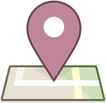
Until now, location apps like Foursquare and Gowalla were adopted by a pretty narrow niche. Either you were in or you were out. Places now puts location tagging squarely in front of the average social user in the world’s most trafficked social platform.
A few thoughts:
Places will have a different role. I’m interested to see if and how Places becomes integrated among Facebook users. I think the absence of the mayorship nonsense will force the social marketplace to think about how they want to use location tracking. How can identifying your location bring value to the average personal network?
I anticipate a honeymoon period of requisite experimentation. Places will then settle in as a glorified status update for select circumstances. I’m guessing I’ll reserve Places for remarkable events and places that may have real meaning for people who follow me. Knowing that I’m drinking Coffee at Starbucks or shopping at Ace Hardware isn’t likely to help people understand me or want to connect to me.
Within the core of hardcore Foursquare and Gowalla users we all came to tolerate the inane. It was part of the game. It was interesting to watch and even more interesting to think through its potential applications. Facebook’s adoption will serve as something of an experiment with the average social user. I suspect that banal geoupdate will become an embarrassing part of social’s history.
Location has become a commodity. Places makes location functionality no longer a novelty. In fact, as of last week, it’s official: location tagging is old news. And checking in alone won’t create the value necessary to drive broad adoption. It’s what Facebook plans to do to incent participation that will make it or break it.
Expect derivative effect for Foursquare and Gowalla. If Places gains any traction expect there to be a drafting effect on Facebook and Gowalla. Curiosity with location may drive interest in mayorship among the vast population of those who have never heard of Foursquare. I don’t expect Foursquare and Gowalla to be going anywhere soon.
Location features may offer professional value. Location tagging can serve a very specific service in telling and selling your expertise. It’s clear from watching my professional contacts on LinkedIn that location serves to tell a lot about who you are. I find it valuable to see what my peers are up to in their work. It helps me to understand how they work and what they do.
I’ve also noticed in my network that geotracking’s biggest critics are the first to advertise their specific location on Twitter when it serves to tell the world about their involvement on a panel or involvement in a particularly sexy meeting of influentials. Only in the social media space is hypocry eclipsed by vanity.
Transparency will set you free – or maybe not. The Church of Facebook believes that the truth will set us free. The more we know about one another the more we will be forced to face the music of our own actions. While the Facebook ideology never referred to health and individual responsibility, there may be something to it.
So that leads me to think that location-based services like Places can serve some very specific roles concerning health. While theoretical privacy concerns are the target of criticism, I think an understanding of location may have real power in understanding the relationship between variables like where we hang and our predisposition for chronic disease. Let’s see if Facebook is interested in the health outcomes business.
Finally, check out Facebook’s Places promotional clip on YouTube.
Beyond the desperately global feel to the vid, what struck me was the image of the family at the table with the voiceover stating, “I expect in the future a lot of people will share their lives this way.” Just at that moment the father feeds the child. Chilling in a strange way – but then again that comes from someone raised with a rotary phone.
Facebook sees itself as the next generation’s global platform for communication with the same impact as the invention of the telephone. Places is just another step in that direction.